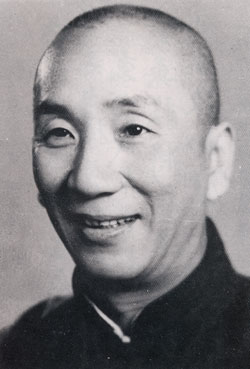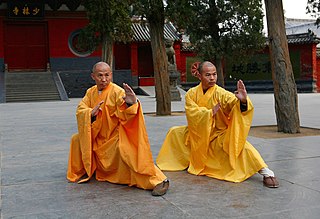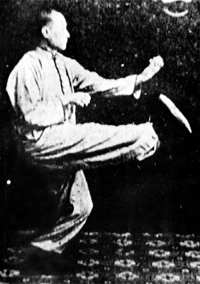
Ip Man, also known as Yip Man, was a Chinese martial artist. He became a teacher of the martial art of Wing Chun when he was 20. He had several students who later became martial arts masters in their own right, the most famous among them being Bruce Lee.

Hung Ga (洪家), Hung Kuen (洪拳), or Hung Ga Kuen (洪家拳) is a southern Chinese martial art belonging to the southern Shaolin styles. The hallmarks of Hung Ga are strong stances, notably the horse stance, or "si ping ma" (四平馬), and strong hand techniques, notably the bridge hand and the versatile tiger claw. Traditionally, students spent anywhere from several months to three years in stance training, often sitting only in horse stance from half an hour to several hours at a time, before learning any forms. Each form could then take a year or so to learn, with weapons learned last. In current times, this mode of instruction is generally considered impractical for students, who have other concerns beyond practicing kung fu. However, some instructors still follow traditional guidelines and make stance training the majority of their beginner training. Hung Ga is sometimes mischaracterized as solely external—that is, reliant on brute physical force rather than the cultivation of qi—even though the student advances progressively toward an internal focus.

Eagle Claw is a style of Chinese martial arts known for its gripping techniques, system of joint locks, takedowns, and pressure point strikes, which is representative of Chinese grappling known as Chin Na. The style is normally attributed to the famous patriotic Song dynasty General Yue Fei. Popular legends states that he learned martial arts from a Wudang Monk named Zhou Tong and later created Eagle Claw to help his armies combat the invading armies of the Jin dynasty. It was passed down until the Ming dynasty. Thus, the style took on long range strikes and aerial jumps. During the Qing dynasty, the military instructor Liu Shi Jun became known as the modern progenitor of Eagle Claw and taught many students. His student Liu Cheng You later taught Chen Zizheng who was invited to teach the style in the prestigious Chin Woo Athletic Association during the Republican era. The style spread as Chin Woo opened sister schools in other provinces. Today, it is practiced around the world.

Drunken Master, also known as Drunken Master The Beginning, is a 1978 Hong Kong martial arts comedy film directed by Yuen Woo-ping and produced and co-written by Ng See-yuen. The film features much of the same crew as Yuen's Snake in the Eagle's Shadow released earlier the same year, including lead actors Jackie Chan, Yuen Siu-tien, and Hwang Jang-lee; although narratively unrelated, Drunken Master bears similarities to its predecessor in its story and style.
Leung Yee-tai was a Wing Chun master of the late Qing Dynasty.

Southern Praying Mantis is a Chinese martial art originating with the Hakka people. It is most closely associated with Hakka-origin styles such as Southern Dragon Kung Fu and Bak Mei.
There are at least eight distinct lineages of the martial art Wing Chun. These are mostly little-known outside of China, and each has its own history of origin. In the West, Wing Chun's history has become a mix of fact and fiction due to the impacts of early secrecy and modern marketing. Additionally, there are competing genealogies within the same branch or about the same individual teacher.
Yuen Siu-tien was a Hong Kong actor and martial artist. In the late 1970s, Yuen is perhaps best known as Beggar So in three films: Drunken Master, Story of Drunken Master and his final film Dance of the Drunk Mantis. He starred in several films with film actors like Jackie Chan and under the direction of his real-life son Yuen Woo-ping.

Jow Ga kung fu is a form of Chinese martial art. It was founded by Jow Lung who was born in 1891, on the eleventh day of the third lunar month in Sa Fu Village of the Guangdong province, and died in 1919. His father was Jow Fong Hoy and his mother’s maiden name was Li. At the time of its inception, this particular style of kung fu was labeled as having the head of Hung Gar, the tail of Choy Gar and the patterns of the tiger and leopard, or simply Hung Tao Choy Mei. It was so labeled because the essential techniques incorporated the muscular and mighty movements of Hung Gar and the swift footwork and complex kicking of Choy Gar, making it a very effective form of self defense with emphasis on simultaneous attack and defense.

Lam Sai-wing was a Hung Gar martial artist. He was a student of the Chinese martial artist, acupuncturer and folk hero of Cantonese ethnicity, Wong Fei-hung.
This is a list of films featuring the Chinese martial arts master and folk hero of Cantonese ethnicity, Wong Fei-hung. There are 123 in total. Where possible alternative titles have been included, particularly the official English language titles or literal translations.

New Heavenly Sword and Dragon Sabre is a Hong Kong television series adapted from Louis Cha's novel The Heaven Sword and Dragon Saber. The series was first broadcast on TVB Jade in Hong Kong in 1986.

The Duke of Mount Deer is a Hong Kong television series adapted from Louis Cha's novel The Deer and the Cauldron. It was first aired on TVB in Hong Kong in 1998.
The Hong Kong Special Administrative Region Basic Law Consultative Committee was an official body established in 1985 to canvass views in Hong Kong on the drafts of the Hong Kong Basic Law.
Dark Tales is a series of Hong Kong television period supernatural dramas that originally aired on Jade from 18 March 1996 to 1 May 1998, consisting of two installments with 75 episodes. Based on Qing Dynasty writer Pu Songling's series of supernatural tales called Strange Tales from a Chinese Studio, Dark Tales is produced by TVB and stars a cast of mainly Hong Kong and Taiwanese actors.

The Incredible Kung Fu Master, also known as The Kung Fu Master is a 1979 martial arts action comedy film directed by Joe Cheung in his directorial debut and starring Sammo Hung and Stephen Tung, the latter in his first leading role. This film features an action direction from a number of famous action directors including Sammo Hung Stunt Team, Lam Ching-ying, Billy Chan, Bryan Leung and Yuen Biao.
Yun Mu Kwan was one of the original five "kwans" that arose in Korea following World War II. It was the name of the place where a generic form of Japanese karate (Shotokan) was being taught by a number of Korean students who had studied in Japan and returned to Korea in the first half of the twentieth century, bringing the Japanese art with them. Yun Mu Kwan, as a style, would eventually be renamed Jidokwan by various former students and would become one of the core styles that contributed to the development of what is today known as Taekwondo.
Eagle Han-ying, Korean name Kim Young Il (김영일) was a South Korean actor and martial artist, who rose his fame in South Korea through various Korean drama series from the 90. Outside of Korea, he is best known with his appearance with many kung fu films from the range of Korean, Hong Kong and Taiwanese production.
Chui Chung-San was a Hong Kong actor, director, choreographer, martial artist and stuntman. He was known for being an action director and stuntman. Chui was known for films such as The Rebellious Reign, Kung Fu Vs. Yoga, Two Fists Against the Law and 7 Grandmasters; as well as other various Taiwanese television shows.
Chan Kowk-wai was born on 3 April 1936, in Taishan in the province of Guangdong, China. He introduced traditional Shaolin kung fu to Brazil through the China-Brazil Kung Fu Academy. His disciples have spread as far as the USA, Canada, Spain, Argentina and the Czech Republic.








